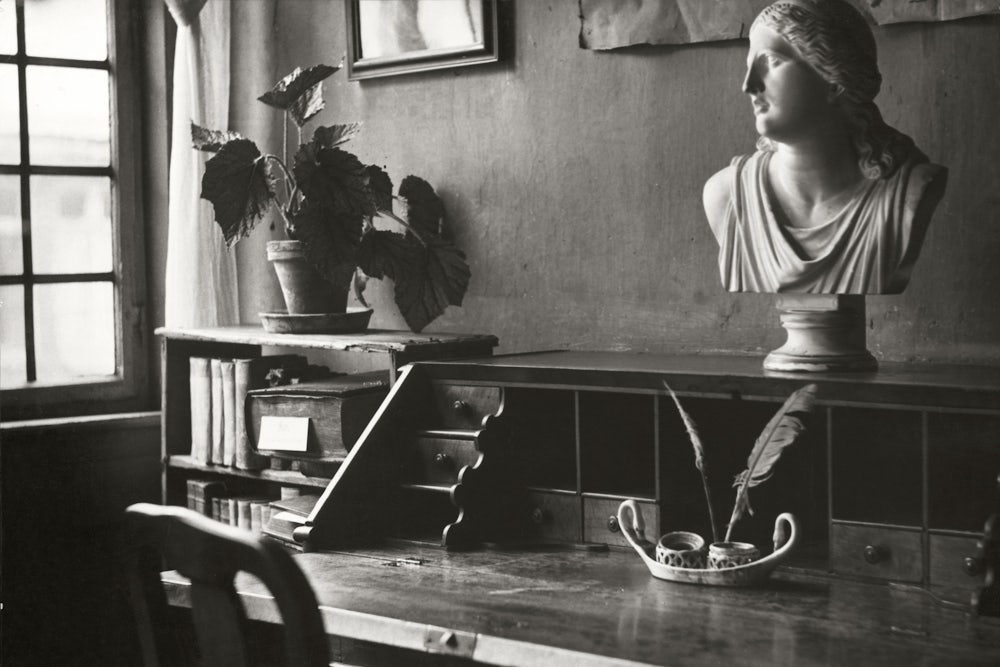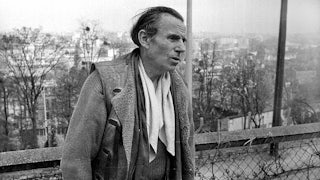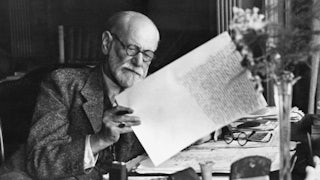Nearly all discussions of criticism, it seems to me, start of with a false assumption, to wit, the assumption that the primary motive of the critic, the impulse which makes a critic of him and not a politician or, a stockbroker, is pedagogical—that he writes because he is possessed by a yearning to disseminate some specific doctrine, epistemological, psychological, historical, or aesthetic. This is true, I believe, only of bad critics, and its degree truth increases in direct ratio to their badness. The motive of the critic who is really worth reading—the only critic of whom, indeed, it may be said truthfully that it is at all possible to read him—is something quite different. That motive is not the motive of the pedagogue, but the motive of the artist. It is simply a desire for self-expression, a thirst to function more broadly and brilliantly than the general, obscure in origin but irresistible in force.
His choice of criticism rather than creative writing is chiefly a matter of temperament—perhaps, more accurately, a matter of hormones and intestinal flora—with accidents of education and environment to help. The feelings that happen to be dominant in him at the moment the scribbling frenzy seizes him and that move him powerfully to seek expression for them in words, are feelings inspired, not by life itself, but by books, pictures, music, sculpture, architecture, religion, philosophy—in brief by some other man’s feelings about life. They are thus second-hand, and are rightly regarded by creative artists as inferior to their own first-hand reactions.
If a critic continues on this plane, if he lacks the intellectual agility and enterprise needed to make the leap from the work of art to the vast and mysterious complex of phenomena behind it, then he remains a mere reviewer of and valet to the ideas of his betters, and is of little more importance to the world than a schoolmaster, a newsmonger, or an auctioneer. But if a genuine artist is concealed within him—if his feelings are really profound and original, and his capacity for self-expression is above the average of educated men—then he moves inevitably from the work of art to life itself, and begins to take on a dignity that he formerly lacked. It is impossible to think of a man of any actual force and originality, universally recognized as having those qualities, who spent his whole life appraising and describing the work of other men.
Did Goethe, or Carlyle, or Matthew Arnold, or Sainte-Beuve, or Macaulay, or even, to come down a few pegs, Lewes, or Lowell, or Hazlitt? Certainly not. The thing that becomes most obvious about the writings of all such men, once they are examined carefully, is that the critic is always being swallowed up by the creative artist—that what starts out as the review of a book, or a play, or other work of art, usually develops very quickly into an independent essay upon the theme of that work of art, or upon some theme that it suggests—in a word, that it becomes a fresh work of art, and only indirectly related to the one that suggested it. This fact, indeed, is so plain that it scarcely needs statement.
What the pedagogues always object to in, say, the Quarterly reviewers is that they forgot the books they were supposed to review, and wrote long papers—often, in fact, small books—expounding ideas of their own, many of them vastly removed from the ideas in the books under review. Every critic who is really worth reading falls into this habit. He cannot stick to his task: what is before him is always infinitely less interesting to him than what is within him. If he is genuinely first-rate—if what is within him stands the test of type, and wins an audience, and produces the reactions that every artist craves—then he usually ends by abandoning the criticism of specific works of art altogether, and setting up shop as a general merchant in general ideas, i. e., as an artist working in the materials of life itself.
Mere reviewing, however conscientiously and competently it is done, is plainly a much inferior business. Like writing poetry, it is chiefly a function of intellectual immaturity. The young literatus just out of the university, having as yet no capacity for grappling with the fundamental mysteries of existence, is put to writing review’s of books, or plays, or music, or painting. Very often he does it extremely well; it is, in fact, not hard to do well, for even decayed pedagogues often do it, as such graveyards of the intellect as the New York Times bear witness. But if he continues to do it, whether well or ill, it is a sign to all the world that his growth ceased when they made him Artium Baccalaureus.
Gradually he becomes, whether in or, out of the academic grove, a pedagogue, which is to say, an artisan devoted to diluting and retailing the ideas of his superiors—not an artist, not even a bad artist, but almost the antithesis of an artist. He is learned, he is sober, he is painstaking, and accurate—but he is as hollow as a jug. Nothing is in him save the ghostly echoes of other men’s thoughts and feelings. If he were a genuine artist he would have thoughts and feelings of his own, and the impulse to give them objective form would be irresistible. An artist can no more withstand that impulse than a politician can withstand the temptations of a job. There are no mute, inglorious Miltons, save in the hallucinations of poets. The one sound test of a Milton is that he functions as a Milton. His difference from other men lies precisely in the superior vigor of his impulse to self-expression, not in the superior beauty and loftiness of his ideas. Other men, in point of fact, often have the same ideas, or perhaps even loftier ones, but they are able to suppress them, usually on grounds’ of decorum, and so they escape being artists, and are respected by right-thinking persons, and die with money in the bank, and are forgotten in two weeks.
Obviously, the critic whose performance we are commonly called upon to investigate is a man standing somewhere along the path leading from the beginning that I have described to the goal. He has got beyond being a mere cataloguer and valuer of other men’s ideas, but he has not yet become an autonomous artist—he is not yet ready to challenge attention with his own ideas alone. But it must be plain that his motion, in so far as he is moving at all, must be in the direction of that autonomy— that is, unless one imagines him sliding backward into senile infantilism: a spectacle not unknown to literary pathology, but too pathetic to be discussed here. Bear this motion in mind, and the true nature of his aims and purposes becomes clear; more, the incurable falsity of the aims and purposes usually credited to him becomes equally clear.
He is not actually trying to perform an impossible act of arctic justice upon the artist whose work gives him a text. He is not trying, with mathematical passion, to find out exactly what was in that artist’s mind at the moment of creation, and to display it precisely and in an ecstasy of appreciation. He is not trying to bring the work discussed into accord with some gaudy theory of aesthetics, or ethics, or truth, or to-determine its degree of departure from that theory. He is not trying to lift up the fine arts, or to defend democracy against sense, or to promote happiness at the domestic hearth, or to convert sophomores into right-thinkers, or to serve God. He is not trying to fit a group of novel phenomena into the orderly process of history. He is not even trying to discharge the catalytic office that I myself, in a romantic moment, once sought to force upon him. He is, first and last, simply trying to express himself. He is trying (a) to arrest and challenge a sufficient body of readers, to make them pay attention to him, to impress them with the charm and novelty of his ideas, to provoke them into an enchanted awareness of him, and (b) to achieve thereby for his own inner ego that agreeable feeling of a function performed, a tension relieved, a catharsis attained which Beethoven achieved when he wrote the Fifth Symphony, and a hen achieves every time she lays an egg.
It is, in brief, the “obscure, inner necessity” of Joseph Conrad that moves him: everything else is an afterthought. Conrad is moved by that necessity to write romances; Beethoven was moved to write music; poets are moved to write poetry; critics are moved to write criticism. The form is nothing; the only important thing is the motive power—and it is the same in all cases. It is the hot yearning of every man who has ideas to empty them upon the world, to hammer them into plausible and ingratiating shapes, to compel the attention and respect of his equals, to lord it over his inferiors. So seen, the critic becomes a far more transparent and agreeable fellow than ever he was in the discourses of the psychologists who sought make him a mere appraiser in an intellectual custom house, a gauger in a distillery of the spirit, a just and fallible judge upon the cosmic bench. Such offices, point of fact, never fit him. He always bulges over confines. So labelled and estimated, it always turns that the specific critic under examination is a very bad one, or no critic at all. But when he is thought of, not as pedagogue, but as artist, then he begins to take on reality, and, what is more, dignity.
Carlyle was surely no just and infallible judge; on the contrary, he was full of prejudices, biles, naivetes, humors. Yet he is read, consulted, attended to. Macaulay was unfair, inaccurate, fanciful, lyrical—yet his essays live. Arnold had his faults too, and so did Sainte-Beuve, and so did Goethe, and so did another of that line—and yet they are remembered today and all the learned and conscientious critics of their time laboriously concerned with the precise intent of the artists under review, and passionately determined to set forth with god-like care and to relate it exactly to or that great stream of ideas—all these pedants are forgotten. What saved Carlyle, Macaulay and company is as plain as day. They were first-rate artists. They could make the thing charming, and that is always a million times more important than making it true.
Truth, indeed, is something that is believed in only by persons who have never tried personally to pursue it to its fastnesses and grab it by the tail. It is the adoration of second-rate men—men who always receive it at second-hand. Pedagogues believe in immutable truths and spend their lives trying to determine them and propagate them; the intellectual progress of man consist largely of a concerted effort to block and destroy their enterprise. In the department of aesthetics, wherein critics mainly disport themselves, it is almost impossible to think of a so-called truth that shows any sign of being permanently true.
The most profound of principles begins to fade and quiver almost as soon as it is stated. But the work of art, as posed to the theory behind it, has a longer life, particularly if that theory is obscure and questionable, and so cannot be determined accurately. Hamlet, the Mona Lisa, Faust, Dixie, Parsifal, Mother Goose, Annabel Lee, Huckleberry Finn—these things, so baffling to pedagogy, so contumacious to the categories, so mysterious in purpose and utility—these things live.
And why? Because there is in them the delightful flavor of odd and attractive personality, because the quality that shines from them is not that correct demeanor but that of creative passion, because pulse and breathe and speak, because they are genuine works of art. So with criticism. Let us forget all the heavy effort to make a science of it; it is a fine art, or nothing. If the critic, retiring to his cell to concoct his treatise upon a book or play or what-not, produces a piece of writing that shows sound structure, and brilliant color, and the flash of novel and persuasive ideas, and civilized manners, and the charm of an uncommon personality in free function, then he has given something to the world that is worth having, and sufficiently justified his existence. Let him leave the exact truth to professors of aesthetics, who can no more determine it than he can, and will infallibly make it idiotic. He is an artist, not a school-master.
What I preach will be labelled at once and thrust into its pigeon-hole: it is impressionism. True. But it is impressionism that is not to be monkeyed with: it depends too much upon the impressionist.






